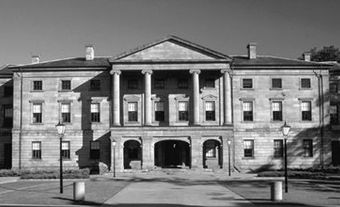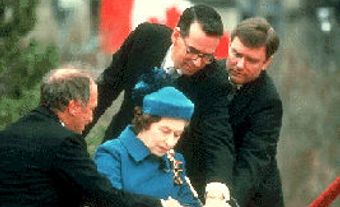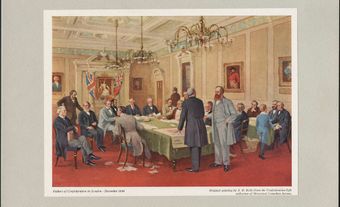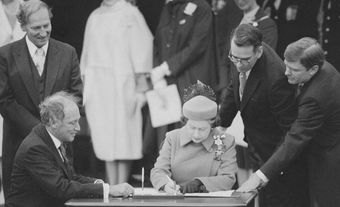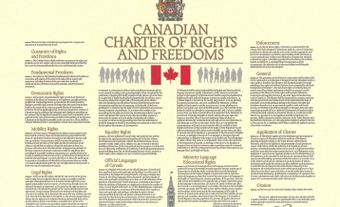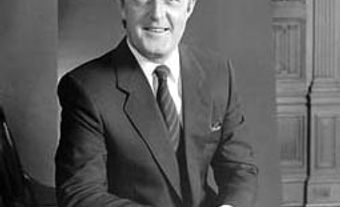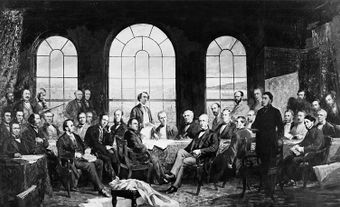In 1982, Canada patriated (took control of) its Constitution from Britain. An amending formula (a method for making changes) and the Charter of Rights and Freedoms were added. These changes took place after a fierce, 18-month struggle. It dominated the agendas of every government in the country. Patriation was complete when Queen Elizabeth II signed the Constitution Act, 1982 on 17 April 1982.
(This article is a plain-language summary of the Patriation of the Constitution. If you are interested in reading about this topic in more depth, please see our full-length entry, Patriation of the Constitution.)

Trudeau’s Promise
Patriation involved two key factors. First, talks between the federal and provincial governments were tense and difficult. They had been fighting over the topic for more than 50 years. Second, Prime Minister Pierre Trudeau had won re-election in February 1980. This meant that Trudeau, a hard-core federalist, would lead the charge.
In May 1980, Trudeau campaigned against the separatists leading up to the Quebec referendum. He made a promise. “We will immediately take action to renew the Constitution and we will not stop until we have done that.” Quebec Premier René Lévesque lost the referendum. He immediately called for Trudeau to fulfil his promise.
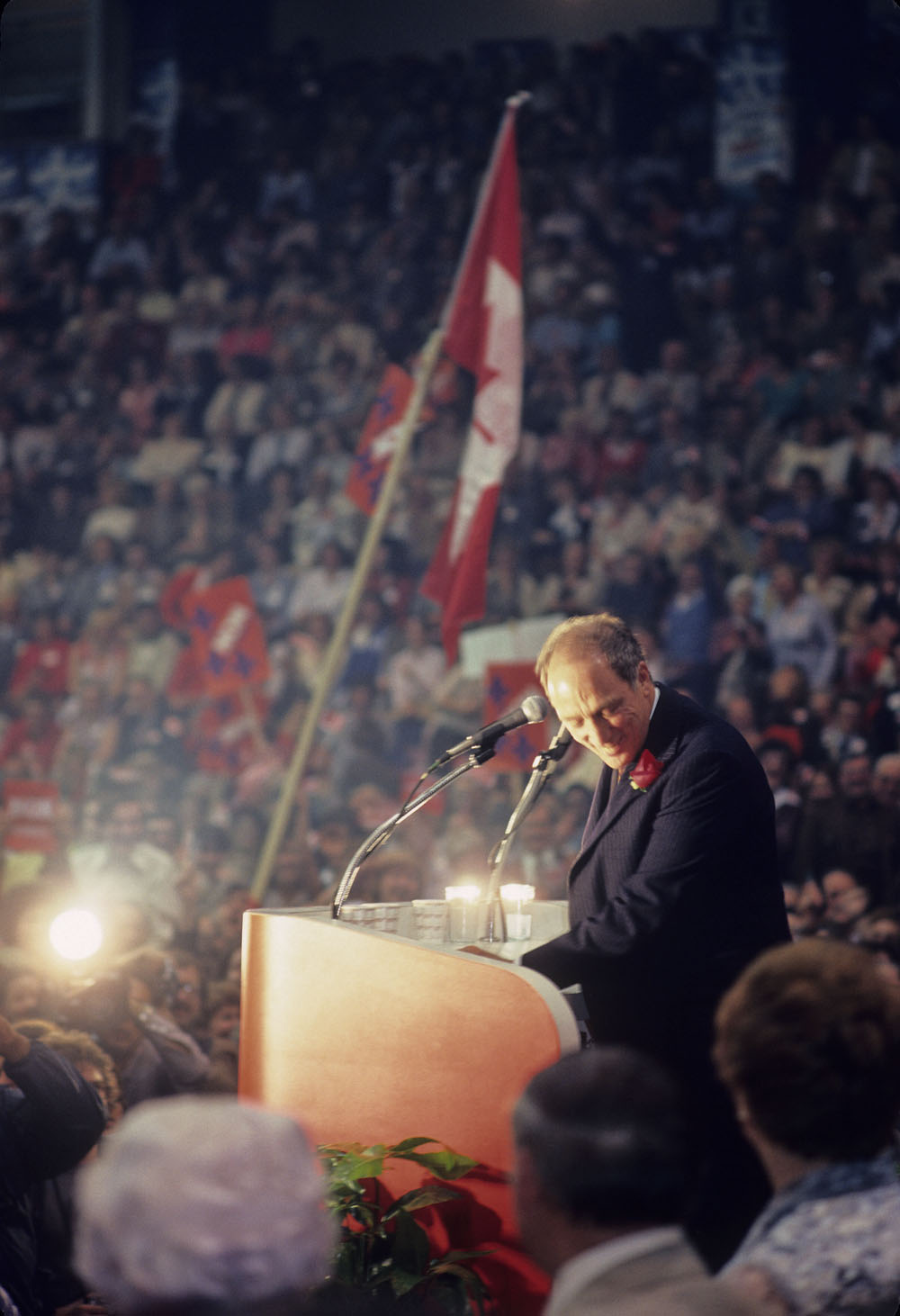
First Steps
Trudeau assembled a group of advisers. He wrote demands for new federal powers over the economy. He also wanted what he called a “people’s package” added to the Constitution. It would include a Charter of Rights and Freedoms.
The premiers, however, wanted to keep or even expand provincial powers. They responded angrily to Trudeau. Still, they agreed to a series of meetings.
First Ministers' Meeting
A four-day First Ministers’ meeting began on 8 September 1980. It was the 10th round of talks on constitutional reform since 1927.
The premiers and the prime minister expressed different visions of Canada. The conference was a failure. Trudeau then announced that he alone would make a request to the British Parliament.
The federal Conservatives under Joe Clark were strongly opposed to this. They held up Trudeau’s resolution in the House of Commons. But federal and provincial Tories were split on the issue. Ontario premier Bill Davis and New Brunswick premier Richard Hatfield both backed Trudeau’s plan.
Gang of Eight
Trudeau’s plan had the new Charter of Rights and Freedoms as its centerpiece. It was harshly criticized. The Charter was rewritten five times. The changes included adding sections on Indigenous peoples’ rights; sexual equality; and equal rights for the disabled.
Six provinces strongly opposed the plan: Quebec; Alberta; Manitoba; Prince Edward Island; Newfoundland; and British Columbia. The group was joined by Saskatchewan and Nova Scotia. This “Gang of Eight” challenged the resolution in provincial courts of appeal.
The Courts Weigh In
In early 1981, courts in Manitoba and Quebec both ruled that the federal government could legally patriate and change the Constitution. No provincial consent was required.
However, weeks earlier, the Supreme Court of Newfoundland had ruled against the federal stance. At the same time, the Gang of Eight was planning to meet in April. They wanted to sign a different accord. It would limit the request to simple patriation with a different amending formula.
Trudeau refused to meet with the Gang of Eight. He ridiculed their “April Accord.” But he agreed to submit his plan to the Supreme Court to settle the issue.
Supreme Court Decision
The Supreme Court ruled that it was legal for Ottawa to act on its own. (See Patriation Reference.) But the court also ruled that any changes that would reduce provincial powers would require provincial “consensus.”
This split decision was a messy win for both sides. It led to what Trudeau called “the one last time” conference. It began in Ottawa on 2 November 1981.

"The One Last Time" Conference
The four-day meeting began in Ottawa on 2 November 1981. By the third day, talks were stalemated. Trudeau said that perhaps only a referendum could resolve the issue. Nearly all day was then spent on the topic of a referendum. This idea was well received by Lévesque. But the idea of another referendum on national unity struck fear into the other Gang of Eight premiers.
The "Kitchen Accord"
At the end of the third day, Justice Minister Jean Chrétien met the attorneys general of Saskatchewan and Ontario in an unused kitchen. They drafted what came to be called the “kitchen accord.” It helped bridge the divide between Ottawa and the Gang of Eight.
Chrétien accepted a compromise. It included a “notwithstanding clause.” It would allow governments to excuse their laws from certain Charter rights. The clause was crucial in winning provincial consent for a deal.

The “Night of the Long Knives”
Some points proposed by Newfoundland premier Brian Peckford were added to the Kitchen Accord. Most provincial delegations were notified about the draft late that night. But the group from Quebec was not informed. Instead, Lévesque was shown the completed package on the last day of the meeting. Lévesque felt betrayed. The incident became known as the “night of the long knives.” It fuelled Quebec separatism for years to come.
After some minor tweaks, the federal government, Ontario and New Brunswick signed on. The deed was done. Lévesque was the only premier who did not sign.
Constitution Act, 1982
By 5 November 1981, the fight was over. The resolution was fleshed out with sections concerning Indigenous peoples and women. It was quickly approved by the British Parliament. Queen Elizabeth II signed the Constitution Act, 1982 in Ottawa on 17 April 1982.
See also Constitution of Canada (Plain-Language Summary); Constitution Act, 1867 (Plain-Language Summary); Constitution Act, 1982 (Plain-Language Summary); Canadian Charter of Rights and Freedoms (Plain-Language Summary).

 Share on Facebook
Share on Facebook Share on X
Share on X Share by Email
Share by Email Share on Google Classroom
Share on Google Classroom
